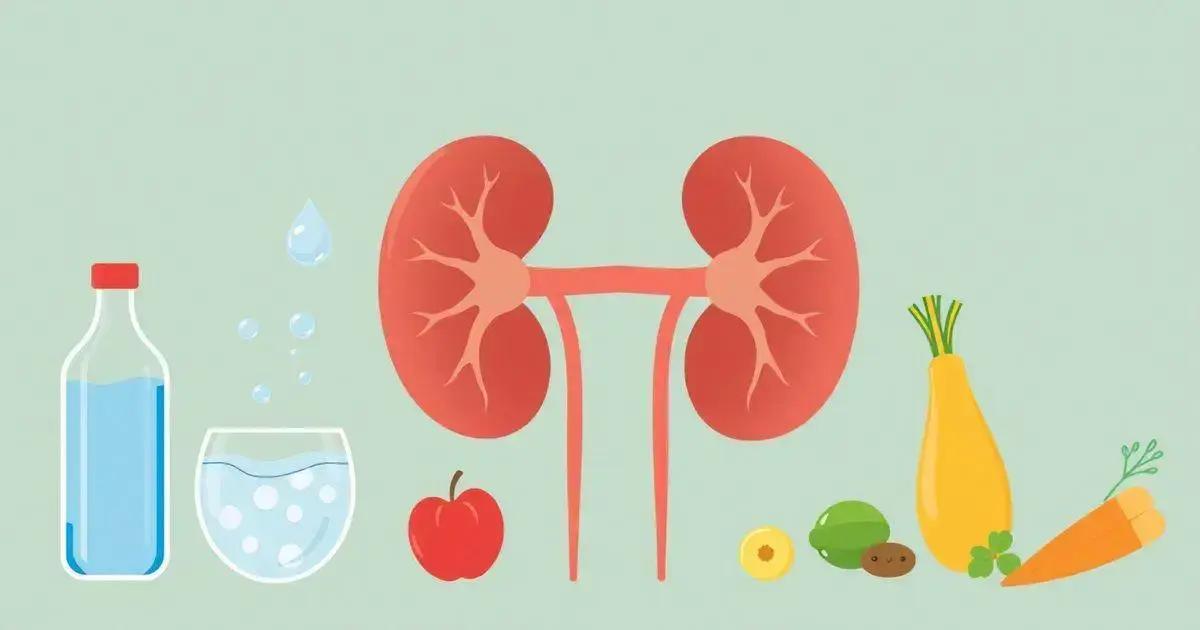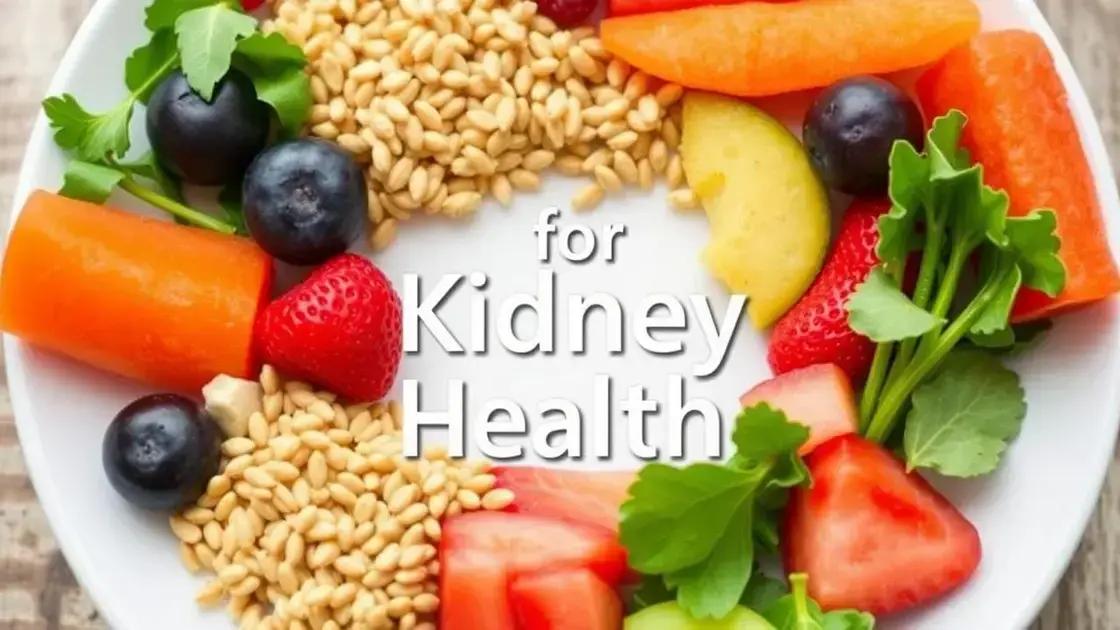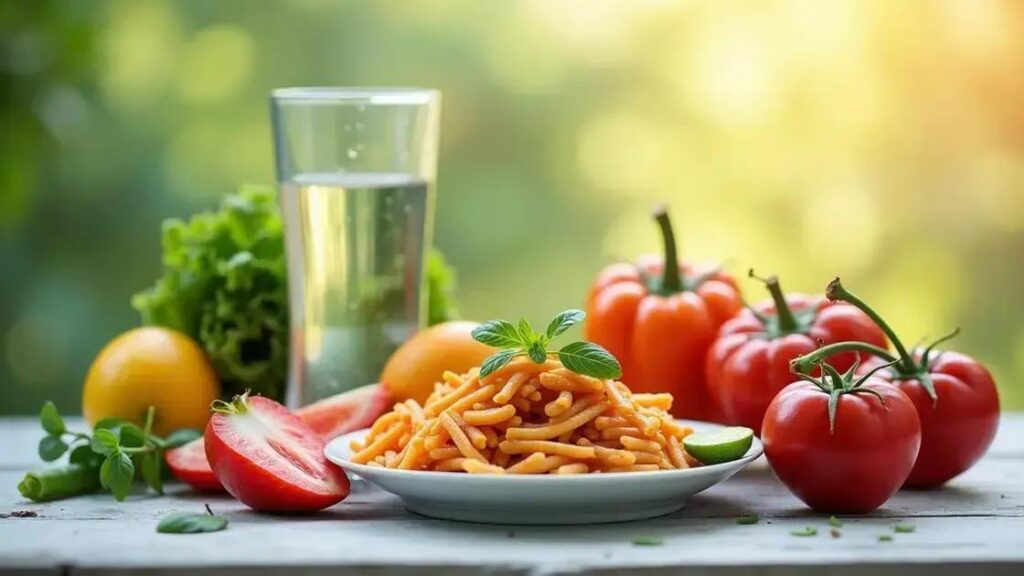To keep your kidneys healthy with hydration and diet, drink plenty of water, eat a balanced diet rich in fruits and vegetables, limit sodium and unhealthy foods, and maintain an active lifestyle. Monitoring blood pressure and avoiding harmful habits like smoking are also essential for optimal kidney function.
Keeping your kidneys healthy with hydration and diet is essential for overall well-being. Kidneys play a crucial role in filtering waste and maintaining fluid balance in the body. In this article, we will discuss how proper hydration and dietary choices can significantly enhance your kidney function. Let’s explore the key factors that contribute to optimal kidney health.
Understanding the Role of Kidneys

Understanding the Role of Kidneys
Your kidneys are vital organs that help keep your body functioning well. They filter blood to remove waste and excess substances, which are then excreted as urine. Each kidney has about a million tiny filtering units called nephrons. These nephrons are crucial for maintaining the body’s balance of fluids, electrolytes, and waste products.
How Kidneys Maintain Balance
The kidneys play a key role in regulating blood pressure, electrolytes, and red blood cell production. They balance sodium, potassium, and calcium levels, which are essential for many bodily functions. By controlling how much water is retained or passed out, your kidneys also help to keep blood pressure stable.
Kidneys and Hydration
Staying hydrated is critical for kidney health. When you’re well-hydrated, your kidneys can efficiently filter out waste. Dehydration can lead to kidney stones and urinary tract infections, which can further harm kidney function. Drinking enough water helps your kidneys to work effectively and reduce the risk of kidney-related issues.
Protecting Your Kidneys
By understanding the role of your kidneys, you can take steps to protect them. This means drinking enough fluids and making mindful dietary choices. A balanced diet, rich in fruits, vegetables, and whole grains, aids your kidneys in their crucial functions and can help prevent kidney disease.
The Importance of Hydration

The Importance of Hydration
Hydration is essential for your overall health, especially for your kidneys. The kidneys need water to perform their functions effectively, such as filtering waste from the blood and balancing electrolytes. When you’re dehydrated, your kidneys can’t work as efficiently, leading to potential long-term issues.
How Dehydration Affects Kidneys
Dehydration can cause a concentration of uric acid in the blood, increasing the risk of kidney stones. It can also lead to urinary tract infections, which may harm kidney function. In severe cases, prolonged dehydration can contribute to kidney disease.
Daily Hydration Guidelines
To maintain good hydration, aim to drink at least eight 8-ounce glasses of water per day, or about 2 liters. Factors like climate, physical activity, and individual health can affect your specific needs, so adjust your intake accordingly.
Signs You Need More Water
Be aware of signs your body might need more water. Common indicators include dry mouth, dark-colored urine, fatigue, and dizziness. If you notice these symptoms, increase your water intake to support kidney health.
Dietary Choices for Kidney Health

Dietary Choices for Kidney Health
Your diet is vital for maintaining healthy kidneys. Eating the right foods can help prevent kidney disease and support overall kidney function. It’s essential to focus on foods that promote kidney health and avoid those that can harm them.
Foods to Include
Incorporate a variety of fruits and vegetables into your diet. Apples, berries, and leafy greens are excellent choices. They are rich in antioxidants and vitamins that support kidney function. Whole grains like brown rice and oats can also be beneficial, providing essential nutrients and fiber.
Limit Certain Nutrients
While some foods are beneficial, others should be limited. Reduce your intake of sodium to help control blood pressure. High levels of sodium can lead to fluid retention and strain the kidneys. Excessive consumption of foods high in phosphorus, like processed meats and sodas, should also be avoided as they can be harmful to kidney health.
Healthy Protein Sources
Choose healthy sources of protein such as fish, poultry, and plant-based options like beans and lentils. These can provide essential amino acids without overloading your kidneys with excess protein, which can be especially important for those with existing kidney issues.
Tips for Maintaining Kidney Function

Tips for Maintaining Kidney Function
Taking care of your kidneys is essential for overall health. Here are some practical tips to help maintain kidney function and support your kidneys in their role.
Stay Hydrated
Make sure to drink plenty of water each day. Staying hydrated helps your kidneys filter waste products more effectively. Aim for at least eight 8-ounce glasses of water daily, adjusting based on your activity level and climate.
Monitor Your Blood Pressure
High blood pressure can damage your kidneys over time. Regularly check your blood pressure and take steps to keep it within a healthy range. This may include reducing sodium intake, exercising, and managing stress.
Be Active
Exercise is key to maintaining kidney health. Aim for at least 150 minutes of moderate aerobic activity each week. Physical activity helps control weight, improve blood flow, and maintain overall organ health.
Limit Alcohol and Avoid Smoking
Reduce alcohol consumption and quit smoking to protect your kidneys. Both habits can lead to issues like high blood pressure and kidney disease. Seek support for smoking cessation if needed.
Taking Charge of Your Kidney Health
Understanding how to keep your kidneys healthy with hydration and diet is crucial for overall well-being. By focusing on adequate hydration, making smart dietary choices, and following practical tips for maintaining kidney function, you can protect your kidneys and enhance their performance.
Remember that simple lifestyle changes like drinking enough water, eating a balanced diet, and staying active can have a huge impact. Regular health check-ups, monitoring blood pressure, and avoiding harmful habits will further support your kidneys in functioning optimally.
By prioritizing kidney health, you not only improve your own quality of life but also invest in your future wellbeing.
FAQ – Frequently Asked Questions about Keeping Your Kidneys Healthy
Why is hydration important for kidney health?
Hydration helps your kidneys filter waste and maintain fluid balance, reducing the risk of kidney stones and infections.
What types of foods are best for kidney health?
Fruits, vegetables, whole grains, and healthy protein sources like fish and beans support kidney functionality.
How can I tell if I am dehydrated?
Signs of dehydration include dry mouth, dark urine, fatigue, and dizziness. It’s important to increase water intake if you notice these symptoms.
What lifestyle changes can help maintain kidney function?
Staying hydrated, exercising regularly, monitoring blood pressure, and avoiding smoking and excessive alcohol can all help protect kidney health.
How often should I have my kidney function checked?
It’s recommended to get kidney function tested annually, especially if you have risk factors like diabetes or high blood pressure.
Can diet alone prevent kidney disease?
While diet plays a significant role, it should be coupled with other healthy lifestyle choices and regular medical check-ups for kidney health.













